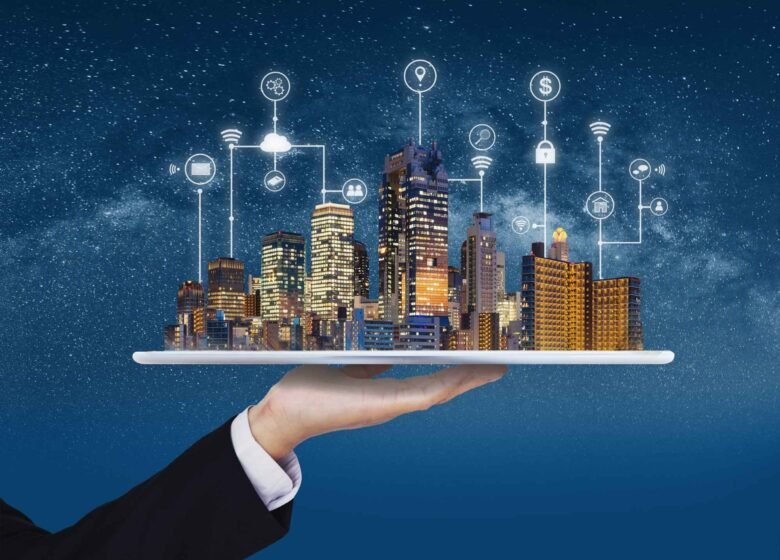Smart cities are one of the most intriguing trends in urban planning. As populations grow and cities face infrastructure, energy, and transportation challenges, technology is crucial for building more efficient and sustainable urban environments. Smart cities integrate digital technologies, sensors, and data-driven systems to improve public services, sustainability, and quality of life. Smart cities integrate technology into every aspect of urban life, making communities more connected, responsive, and environmentally friendly. This transformation goes beyond technology itself and changes the way cities serve their residents.
Technology in Smart Cities
Technology powers smart cities. Cities can use modern communication networks, sensors, and artificial intelligence to collect and analyze massive amounts of data in real time. Urban planners and government agencies use this data to improve energy distribution, waste management, and traffic management. This transformation is based on the Internet of Things (IoT), which connects lighting, parking meters, and transportation systems to central networks. These devices continuously transmit data, improving urban efficiency. 5G technology significantly increases the speed and reliability of data exchange, enabling real-time adaptation to urban life.
Intelligent Transportation Systems
Transportation is one of the most important impacts of smart city technology. Urban traffic and pollution pose serious challenges, and smart transportation solutions are working to address them. Smart cities can monitor traffic trends using sensors, cameras, and AI software and adjust lighting in real time to improve traffic flow. Digital integration helps public transportation systems provide accurate schedules, routes, and delay information. Smart cities are integrating electric and autonomous vehicles to reduce emissions and improve safety. These solutions improve commute efficiency and reduce the environmental impact of transportation.
Sustainability and Energy Efficiency
Smart cities strive to improve sustainability through energy-efficient systems. Aging infrastructure in traditional cities wastes energy, but smart grids with AI and real-time analytics can help. Grids can automatically adjust power distribution to reduce waste and maximize energy efficiency. Smart lighting solutions can dim or brighten based on activity, saving energy and costs. Renewable energy sources like solar and wind are being integrated into municipal energy systems to help green cities. Smart cities reduce CO₂ emissions and address climate change by implementing intelligent energy solutions.
Environmental Monitoring and Waste Management
Improved waste management and environmental monitoring are also essential for living in a smart city. Sensors in smart bins notify waste collectors when they are full, ensuring efficient collection. This reduces operational expenses and waste overflow. Environmental sensors can also detect pollution and alert authorities to health risks in the air and water. These systems help governments enforce environmental regulations and improve urban ecosystems. These smart waste and environmental management solutions help cities remain clean and livable, even as they continue to grow.
Smart Homes, Connected Living
Smart homes are crucial to the smart city ecosystem, giving people more control over their homes. They can control lighting, temperature, security, and appliances through connected devices and smartphone apps. Smart home technology improves energy efficiency, safety, and convenience. Even when away from home, homeowners can remotely control their thermostats to save energy or receive security alerts. More connected homes will shape the digital infrastructure of cities, making urban life more responsive and sustainable.
Smart Healthcare and Wellbeing
Healthcare in smart cities benefits from digital innovation. Smart technologies help hospitals and clinics monitor and diagnose patients more quickly. Wearable technology can track health indicators and share data with doctors, enabling early detection of abnormalities. High-speed internet access and telemedicine allow citizens to consult doctors remotely. Analysis of health data can also help local officials understand public health trends and respond more effectively to disease outbreaks. Smart healthcare systems make healthcare more convenient, affordable, and effective, improving the health of city residents.
Challenges in Developing Smart Cities
Smart cities have many advantages but also some drawbacks. Advanced technologies require significant investments in infrastructure, cybersecurity, and data privacy. Providing internet access to all residents is another priority, especially in developing countries. Another challenge is managing the vast amounts of data collected daily while ensuring privacy and openness. Governments and businesses must collaborate on legislation and ethical standards for data use. Building inclusive, safe, and reliable smart cities requires overcoming these obstacles.
Future Urban Life
Smart cities will shape the future of urban life. Thanks to technological advances, cities will become more connected, sustainable, and citizen-centric. Innovations in artificial intelligence, 5G networks, and the Internet of Things (IoT) will help cities anticipate and respond to challenges. The ultimate goal is to create technologically advanced, human-centered urban landscapes that improve quality of life, social equity, and the environment. Future cities will be vibrant ecosystems where technology and people coexist.
Conclusion
Smart cities leverage technology and innovation to build efficient, sustainable, and inclusive communities. They are redefining connected living by integrating digital systems across infrastructure, transportation, energy, and healthcare. Privacy, cost, and accessibility remain challenges, but the benefits far outweigh them. As more cities embrace smart technologies, urban life will become safer, greener, and more comfortable. The smart city revolution is the next phase of human progress, transforming the way we live, work, and interact.
FAQs
1. What is a smart city?
Smart cities use technology, data, and connectivity to improve transportation, energy, and public safety, making cities more efficient and sustainable.
2. How do smart cities help residents?
Smart cities offer citizens a better quality of life through more convenient transportation, a cleaner environment, better healthcare, and increased energy efficiency.
3. Are smart cities environmentally friendly?
Smart cities minimize carbon emissions and promote sustainable development through renewable energy, waste management, and smart grids.
4. What challenges do smart cities face?
Smart cities face challenges such as high prices, data privacy, and the availability of technology.
5. Will all cities become smart?
Some cities may implement smart systems immediately, but most will gradually embrace digital technologies to improve their viability and sustainability.




